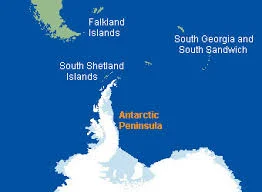Plastic waste and toxic chemicals found in remote parts of the Antarctic this year add to evidence that pollution is spreading to the ends of the Earth, according to environmental group Greenpeace.
Microplastics - tiny pieces of plastic from the breakdown of everything from shopping bags to car tyres - were detected in nine of 17 water samples collected off the Antarctic peninsula by a Greenpeace vessel earlier this year, it said.
Seven of nine snow samples taken on land in Antarctica found chemicals known as PFAs (polyfluorinated alkylated substances), which are used in industrial products and can harm wildlife.
"We may think of the Antarctic as a remote and pristine wilderness," Frida Bengtsson of Greenpeace's Protect the Antarctic campaign said in a statement about the findings.
"But from pollution and climate change to industrial krill fishing, humanity's footprint is clear," she said.
"These results show that even the most remote habitats of the Antarctic are contaminated with microplastic waste and persistent hazardous chemicals."
The United Nations' environment agency says plastic pollution has been detected from the Arctic to Antarctica and in remote places, including the Mariana Trench, the deepest part of the world's oceans in the Pacific.
On Tuesday, it said that less than one tenth of all the plastic made has been recycled, and governments should consider banning or taxing single-use bags or food containers to stem a tide of pollution.
(RTE)
7/6/18
Microplastics - tiny pieces of plastic from the breakdown of everything from shopping bags to car tyres - were detected in nine of 17 water samples collected off the Antarctic peninsula by a Greenpeace vessel earlier this year, it said.
Seven of nine snow samples taken on land in Antarctica found chemicals known as PFAs (polyfluorinated alkylated substances), which are used in industrial products and can harm wildlife.
"We may think of the Antarctic as a remote and pristine wilderness," Frida Bengtsson of Greenpeace's Protect the Antarctic campaign said in a statement about the findings.
"But from pollution and climate change to industrial krill fishing, humanity's footprint is clear," she said.
"These results show that even the most remote habitats of the Antarctic are contaminated with microplastic waste and persistent hazardous chemicals."
The United Nations' environment agency says plastic pollution has been detected from the Arctic to Antarctica and in remote places, including the Mariana Trench, the deepest part of the world's oceans in the Pacific.
On Tuesday, it said that less than one tenth of all the plastic made has been recycled, and governments should consider banning or taxing single-use bags or food containers to stem a tide of pollution.
(RTE)
7/6/18

No comments:
Post a Comment
Only News